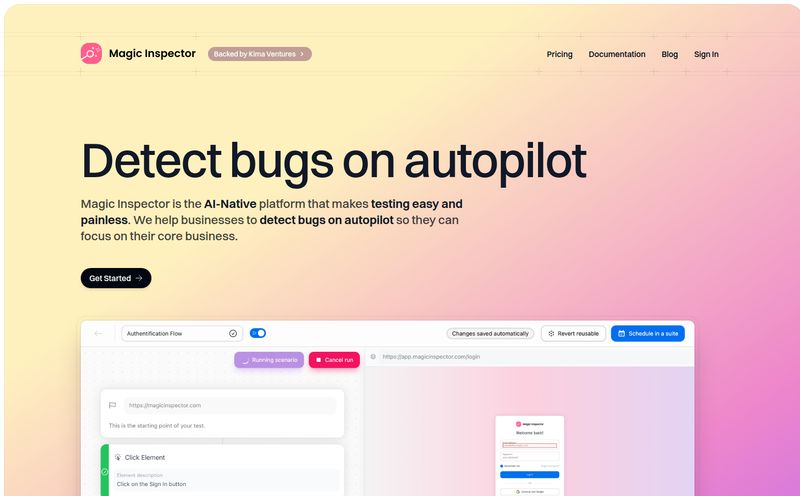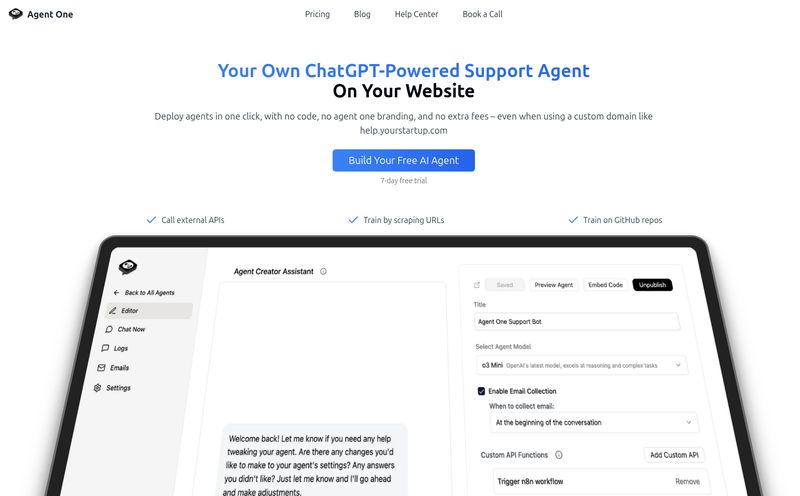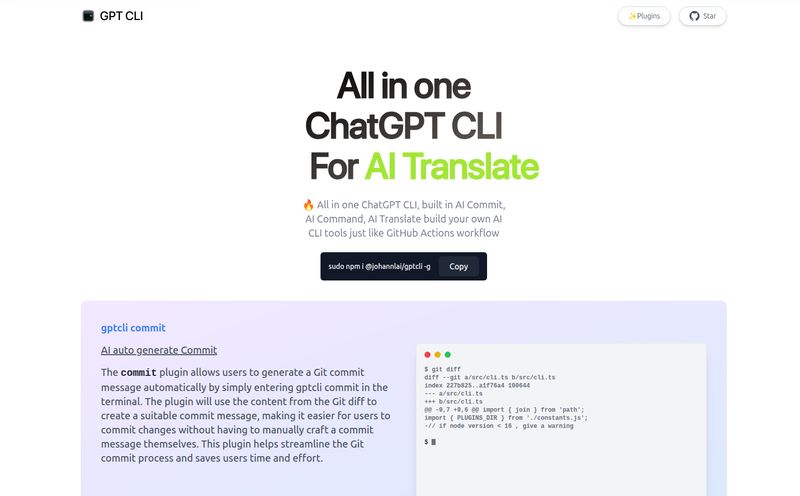I’ve been in the SEO and tech game for years, and I’ve seen more “revolutionary” tools than I can count. Most of them are just flashes in the pan. A new coat of paint on an old idea. But every now and then, something comes along that genuinely makes me sit up and pay attention. Recently, that something has been BLACKBOX.AI.
We’ve all been there. It’s 2 AM, you're staring at a stubborn bug, and the solution feels like it’s in another dimension. You’ve scoured Stack Overflow, sacrificed a rubber duck to the coding gods, and you're about to throw your monitor out the window. It’s in these moments of pure frustration that the promise of a truly intelligent AI partner sounds less like science fiction and more like a necessity. So, when I heard the buzz about an AI agent trusted by over 10 million users and even some Fortune 500 companies, I had to see what the fuss was about.
So, What Exactly is BLACKBOX.AI?
At its core, BLACKBOX.AI markets itself as an AI agent designed to change how we work and learn. That’s a pretty bold claim. But it's not just another chatbot that rephrases your questions. It's positioned as an active participant in your workflow, particularly if that workflow involves writing code, building applications, or deep-diving into research. Think of it less as a tool and more like a junior developer who’s had way too much coffee and learned every programming language overnight. A really, really smart one.
The social proof is strong, I'll give it that. Ten million users is no small feat. It suggests there's real substance here, not just clever marketing. But as we all know, popularity doesn’t always equal perfection.

Visit BLACKBOX.AI
The Standout Features of BLACKBOX.AI
A tool is only as good as its features, right? This is where BLACKBOX.AI starts to get interesting. It's not just a one-trick pony; it’s more like a Swiss Army knife for your digital projects.
More Than Just Autocomplete: The Coding Agent
Okay, we've all gotten used to AI-powered code completion. GitHub Copilot basically made it standard practice. BLACKBOX.AI takes this a step further. It's not just suggesting the next line of code; it claims to have an Autonomous Coding Agent. The idea is that you can give it a task—a set of instructions or rules—and it will work on it, reason through problems, and actually build. I find that fascinating. It integrates directly with VSCode, which is a must-have for me, and also offers its own Web IDE for those who want to stay in the browser. It's this multi-tasking, reasoning capability that sets it apart from a simple suggestion engine. It feels like a genuine attempt at creating a co-worker.
From a Sketch to a Working App? Seriously.
This is the feature that made me raise an eyebrow. The one that could be a total game-changer or a complete gimmick. BLACKBOX.AI has 'Figma to Code' and 'Image to App' functionalities. The promise is wild: you give it a design, a mockup, even a picture of a UI scribbled on a napkin (okay, maybe not a napkin, but you get the idea), and it will generate the front-end code for you.
I've always dreamed of a world where the gap between design and development shrinks. Is this it? I’m cautiously optimistic. If this works even 80% as well as advertised, it could save teams hundreds of hours.
Imagine being able to turn a client's approved Figma design into a functional React or Vue component in minutes instead of days. The potential for rapid prototyping is just immense.
The Brains Behind the Operation
What really ties everything together are the underlying capabilities: Deep Research, Reasoning, and Memory. This is what prevents it from being just a set of disconnected tools. The 'Memory' feature means it learns from your interactions, your coding style, and your project's context. The 'Reasoning' engine is what allows it to tackle complex problems. And 'Deep Research' means it can pull information to solve problems that are outside its immediate training data. It's this combination that makes it feel less like a simple script and more like a thinking partner. Its something I think separates the good AI tools from the great ones.
How Much Does BLACKBOX.AI Cost?
Let's get to the brass tacks. The big question: what's the damage to the wallet? The pricing structure is thankfully straightforward, broken into three main tiers. I've laid it out here so you can see for yourself.
| Plan | Price (per month) | Best For |
|---|---|---|
| PRO | $14.99 | Everyday productivity, freelancers, and individual developers. |
| Business | $19.99 | Enhanced capabilities for small teams and professional use. |
| Ultimate | $99.99 | Custom solutions for larger teams needing top-tier features and support. |
In my opinion, the PRO plan at $14.99 seems like the sweet spot for most individual users. It's competitively priced against other tools in the space and gives you a feel for the core productivity boosters. The Business plan seems logical for small agencies or startups where a few extra bucks per user is worth the enhanced features. The Ultimate plan is clearly aimed at enterprise-level teams that need custom rules and dedicated solutions.
My Final Verdict: Is It Worth Your Time and Money?
So, here’s my honest take. I'm impressed. I came in skeptical, as I always do, but BLACKBOX.AI has some genuinely powerful and forward-thinking features. The autonomous agent and the design-to-code capabilities are more than just buzzwords; they represent a real shift in how we can approach development.
Is it perfect? Of course not. No tool is. There will be a learning curve, and I'm sure the 'Image to App' feature will spit out some hilariously broken code from time to time. Some of the most powerful features are likely locked behind the higher-priced tiers, which is standard but always a bit of a bummer for solo users. But the potential here is undeniable. It's not just a tool for writing code faster; it's a tool for thinking about building things differently. For me, that's a powerful proposition and one that makes BLACKBOX.AI worth keeping a very close eye on.
Frequently Asked Questions about BLACKBOX.AI
- Is BLACKBOX.AI suitable for beginners?
- I think so. It can be a fantastic learning aid. Getting instant code suggestions and seeing how a design can be translated into code could actually accelerate the learning process. Just be careful not to use it as a crutch—make sure you understand the code it's generating!
- How does BLACKBOX.AI compare to GitHub Copilot?
- They are similar but have different focuses. Copilot is heavily integrated into the GitHub ecosystem and is fantastic for pure code completion. BLACKBOX.AI seems to aim for a broader scope with its autonomous agent, research functions, and dedicated app-building features like Figma to Code. It feels more like a project manager than just a pair programmer.
- Can it really build a complete application from a design?
- I'd say it can build the scaffolding of an application. It can generate the front-end components and structure based on a design, which is a massive time-saver. You will almost certainly need to go in and wire up the logic, APIs, and state management yourself. Think of it as an incredibly fast front-end developer, not a one-click app factory.
- Is my code secure when using BLACKBOX.AI?
- This is a critical question for any AI tool. According to their website and general industry standards for such tools, they have security protocols in place. However, I always advise developers not to use sensitive, proprietary code with any third-party cloud-based service unless your company has explicitly vetted and approved it.
- Is the pricing for BLACKBOX.AI worth it?
- Value is subjective, but if the tool saves you even a few hours of development or research time each month, the $14.99 Pro plan pays for itself almost immediately. I'd suggest trying it on a personal project to gauge its impact on your specific workflow.
A Final Thought
In a world overflowing with AI hype, it's refreshing to see a tool that has a clear, practical application and is trying to solve real problems for developers and creators. BLACKBOX.AI isn’t magic, but it's a significant step in the right direction. It's a tool that acknowledges that modern development is about more than just writing lines of code—it’s about research, design translation, and problem-solving. And for that reason, it has earned a spot in my digital toolkit. For now.



